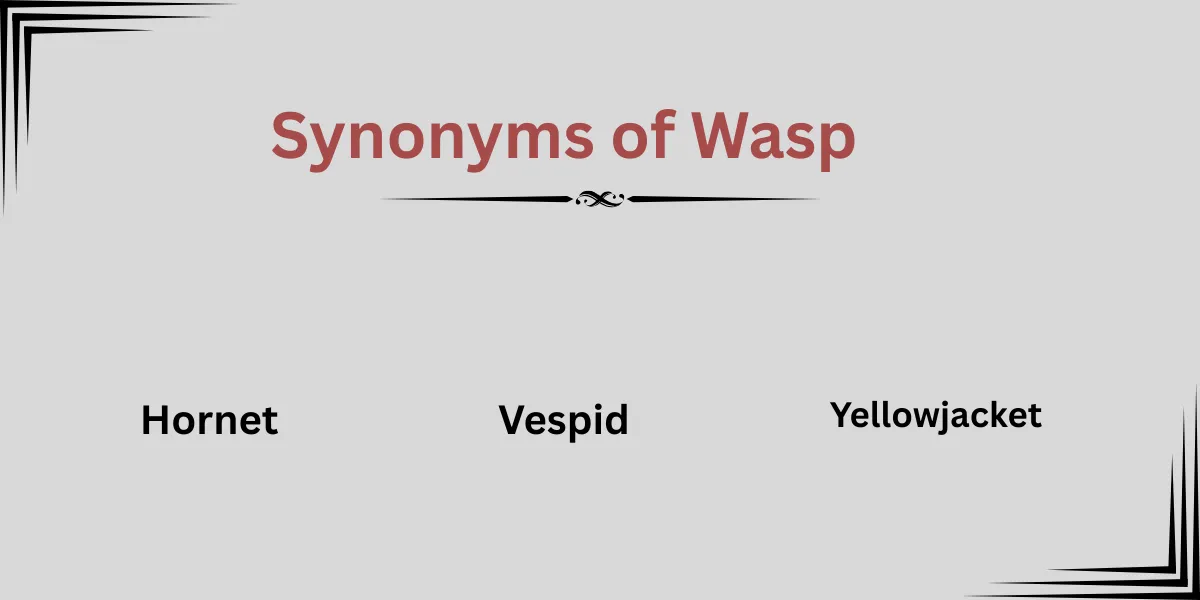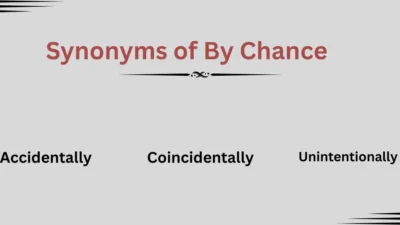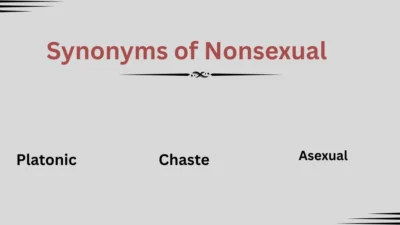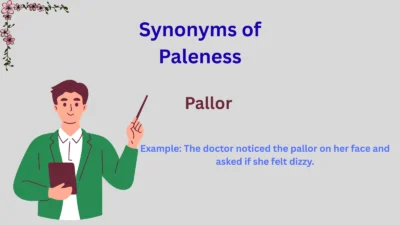Synonyms of wasp, such as hornet, yellowjacket, and bee, describe small, quick, and often stinging insects. For example, a hornet suggests a larger, more aggressive species, while a yellowjacket shows speed and intensity. Each word highlights different traits, from danger and sharpness to activity and agility.
If you’re writing about nature, insects, or using a metaphor, choosing the right synonym for wasp adds precision and vivid imagery.
In this guide, you’ll explore the meaning and example sentence for each synonym of wasp, helping you describe these insects—or their traits—clearly and effectively.
What Does “Wasp” Mean?
A wasp is a small, flying insect known for its sharp sting, quick movements, and often aggressive behavior. Wasps play a role in nature as pollinators and predators of other insects, but they can also pose a threat if provoked.
Depending on how it’s used, wasp can suggest:
- Aggression or danger — for its sting and defensive nature
- Speed and agility — quick, precise movement in flight
- Irritation or annoyance — sometimes used metaphorically for sharp behavior
- Hard work — some species are diligent and organized in building nests
In writing, wasp can be literal, describing the insect, or figurative, highlighting traits like sharpness, quickness, or irritability.
Synonyms of Wasp: Meaning, Examples, and Usage
1. Hornet
Meaning: A large, aggressive type of wasp.
Use when: You want to emphasize size, danger, or intensity.
Example: “The hornet circled his head, daring him to move.”
➡ Best for vivid, threatening imagery.
2. Yellowjacket
Meaning: A bright yellow and black striped wasp known for stinging repeatedly.
Use when: Describing common, persistent wasps or relentless behavior.
Example: “Her criticism came like a swarm of yellowjackets.”
➡ Ideal for emotional or behavioral comparisons.
3. Vespid
Meaning: Scientific family name (Vespidae) that includes most wasps and hornets.
Use when: Writing in scientific or formal contexts.
Example: “Vespids play an important role in controlling pest populations.”
➡ Best for academic or technical tone.
4. Paper Wasp
Meaning: A type of wasp that builds papery nests.
Use when: Focusing on nesting behavior or construction imagery.
Example: “The paper wasp built its home under the roof eaves.”
➡ Useful for descriptive writing or nature essays.
5. Mud Dauber
Meaning: A solitary wasp that makes nests out of mud.
Use when: Describing solitary, quiet, or industrious behavior.
Example: “Like a mud dauber, she worked patiently on her project.”
➡ Conveys calm focus instead of aggression.
6. Insect
Meaning: General term for small arthropods with six legs.
Use when: Discussing broader biological topics.
Example: “Wasps are among the most misunderstood insects.”
➡ Good for general or educational tone.
7. Bug
Meaning: Informal word for insect (though technically a subset).
Use when: Writing casually or conversationally.
Example: “A tiny bug hovered near the picnic table.”
➡ Common in everyday speech and storytelling.
8. Pest
Meaning: Any organism considered troublesome or harmful.
Use when: Highlighting annoyance or intrusion.
Example: “That wasp was more of a pest than a threat.”
➡ Fits irritated or negative emotional tone.
9. Stinger
Meaning: The part of a wasp’s body used to inject venom.
Use when: Focusing on the act of defense or attack.
Example: “She had a verbal stinger for anyone who crossed her.”
➡ Works well in figurative writing.
10. Swarm
Meaning: A group of insects moving together.
Use when: Describing many wasps or chaotic movement.
Example: “A swarm of wasps scattered when the nest was disturbed.”
➡ Suggests intensity and collective action.
11. Drone
Meaning: Male bee or wasp, often associated with laziness or repetition.
Use when: Suggesting monotony or passive behavior.
Example: “He droned through the meeting like a tired wasp.”
➡ Useful for metaphorical tone.
12. Nettle
Meaning: A stinging plant; figuratively used for irritation.
Use when: Describing mild annoyance instead of full aggression.
Example: “His words nettled her like a wasp’s sting.”
➡ Poetic and indirect synonym.
13. Fly
Meaning: A small flying insect.
Use when: Referring to motion or nuisance, not danger.
Example: “He brushed away a fly, mistaking it for a wasp.”
➡ Neutral, everyday substitute.
14. Bumblebee
Meaning: A large, fuzzy bee, gentle compared to wasps.
Use when: Contrasting gentleness with aggression.
Example: “Unlike the calm bumblebee, the wasp never backed down.”
➡ Best for contrast in tone.
15. Bee
Meaning: General pollinating insect related to wasps.
Use when: Referring to industriousness or a buzzing sound.
Example: “The garden buzzed with bees and wasps.”
➡ Common and neutral comparison.
16. Vespine
Meaning: A Literary or poetic term relating to wasps.
Use when: Writing poetically or descriptively.
Example: “A vespine hum haunted the summer air.”
➡ Adds sophistication and mood.
17. Stinging Insect
Meaning: General description emphasizing the sting.
Use when: Discussing all species capable of stinging.
Example: “All stinging insects should be approached with caution.”
➡ Useful for safety or advice tone.
18. Aggressor
Meaning: One who attacks or provokes.
Use when: Using “wasp” metaphorically for human behavior.
Example: “She became the aggressor in every argument.”
➡ Highlights emotional confrontation.
19. Provoker
Meaning: Someone or something that incites a reaction.
Use when: Describing instigation or emotional tension.
Example: “Like a wasp, he was a natural provoker.”
➡ Fits psychological or narrative tone.
20. Hothead
Meaning: A person who reacts angrily or impulsively.
Use when: Replacing “wasp” in its figurative human sense.
Example: “He’s a real hothead—sting first, think later.”
➡ Casual and expressive synonym.
21. Firebrand
Meaning: A passionate, sometimes aggressive person.
Use when: You want to show intensity with purpose.
Example: “She was a firebrand in every debate.”
➡ Adds energy without pure negativity.
22. Fury
Meaning: Violent anger or wrath.
Use when: Describing the emotional impact of a “sting.”
Example: “Her fury was like a swarm of wasps.”
➡ Evocative and dramatic synonym.
23. Irritant
Meaning: Something that causes discomfort or annoyance.
Use when: Highlighting mild aggravation.
Example: “The buzzing sound was more irritant than threatening.”
➡ Clinical or formal tone.
24. Biter
Meaning: Something that bites or attacks.
Use when: You want a rough or animalistic image.
Example: “Those biters come out in the heat of summer.”
➡ Good for colloquial or rustic writing.
25. Predator
Meaning: An organism that hunts others.
Use when: Describing the ecological role of wasps.
Example: “Wasps are efficient predators in controlling caterpillar populations.”
➡ Best for scientific or factual tone.
26. Nuisance
Meaning: A minor annoyance or troublemaker.
Use when: Downplaying danger but stressing irritation.
Example: “The wasp nest near the porch was a nuisance all summer.”
➡ Common in daily conversation.
27. Venom-bearer
Meaning: A Creature capable of injecting poison.
Use when: Emphasizing toxic or dangerous qualities.
Example: “He spoke with the calm of a venom-bearer waiting to strike.”
➡ Metaphorical or literary tone.
28. Buzzing Menace
Meaning: Descriptive phrase for a threatening flying insect.
Use when: Adding drama or suspense to a scene.
Example: “The buzzing menace darted near her ear.”
➡ Best for storytelling or vivid imagery.
29. Stinger-Bug
Meaning: Informal, creative term for wasp or hornet.
Use when: Writing playfully or humorously.
Example: “Don’t go near that stinger-bug!”
➡ Lighthearted substitute for children’s writing.
30. Stingbearer
Meaning: Inventive or poetic term referring to any creature that carries a sting.
Use when: Crafting symbolic or imaginative writing.
Example: “The stingbearer hovered, guarding its fragile dominion.”
➡ Adds originality and emotional depth.
Choosing the Right Synonym: Tone and Context Guide
| Tone / Emotion | Best Synonyms | Context Example |
| Scientific | Vespid, Predator, Insect | Biology reports or essays |
| Aggressive / Dangerous | Hornet, Yellowjacket, Venom-bearer | Action or suspense writing |
| Irritated / Annoyed | Pest, Nuisance, Irritant | Everyday conversation |
| Figurative / Personality | Hothead, Firebrand, Provoker | Describing human behavior |
| Poetic / Literary | Vespine, Stingbearer, Nettle | Symbolic or creative writing |
| Playful / Light | Bug, Stinger-bug, Fly | Casual storytelling |
Cultural & Emotional Contexts
- In Western literature, wasps symbolize anger, provocation, and defense.
- In ecological writing, they represent balance and control in ecosystems.
- In human comparison, “wasp-like” behavior often implies quick temper or sharp wit—so use carefully in tone-sensitive contexts.
Conclusion:
Words like hornet, yellowjacket, and bee are strong synonyms for wasp. They show their small size, quick moves, and sharp sting. Each word adds clear meaning to your writing.
Using these synonyms helps describe nature or behavior in a simple, vivid way.
Even tiny insects can show danger, energy, or hard work. The right word makes your sentences easy to picture and understand.




